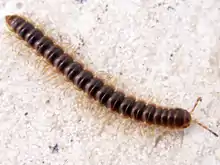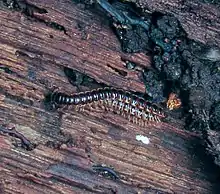Greenhouse millipede
The greenhouse millipede (Oxidus gracilis), also known as the hothouse millipede, short-flange millipede, or garden millipede, is a species of millipede in the family Paradoxosomatidae that has been widely introduced around the world, and is sometimes a pest in greenhouses.[3]
| Oxidus gracilis | |
|---|---|
 | |
| Scientific classification | |
| Domain: | Eukaryota |
| Kingdom: | Animalia |
| Phylum: | Arthropoda |
| Subphylum: | Myriapoda |
| Class: | Diplopoda |
| Order: | Polydesmida |
| Family: | Paradoxosomatidae |
| Genus: | Oxidus |
| Species: | O. gracilis |
| Binomial name | |
| Oxidus gracilis (C. L. Koch, 1847) | |
| Synonyms[2] | |
|
Fontaria gracilis C. L. Koch,1847 | |

Description
Greenhouse millipedes achieve lengths of 18 to 23 mm (0.71 to 0.91 in) as adults, and widths from 2 to 2.5 mm (0.079 to 0.098 in). The dorsal section of each segment has a transverse groove, a trait found in most paradoxosomatids. They are brown in color with pale cream-colored legs and paranota (lateral "keels" extending from each segment).[4]
Distribution
Greenhouse millipedes are thought to be native to Japan, but have been introduced globally. They are found in the tropics as well as temperate North and South America, North of Iran, and all of Europe.[4][2]
References
- "Oxidus gracilis - (C.L. Koch, 1847)". NatureServe Explorer: An online encyclopedia of life. Version 7.1. NatureServe. Retrieved December 29, 2014.
- Hoffman, R. L. (1999). "Checklist of the millipeds of North and Middle America". Virginia Museum of Natural History Special Publications. 8: 1–553. p. 46-417
- McCormack, Gerald (2007). "Oxidus gracilis, Short-flange Millipede". Cook Islands Biodiversity Database, Version 2007.2. Cook Islands Natural Heritage Trust, Rarotonga. Retrieved 20 May 2014.
- Blower, J. Gordon (1985). Millipedes: Keys and Notes for the Identification of the Species. London: Published for the Linnean Society of London and the Estuarine and Brackish-Water Sciences Association by E.J. Brill. ISBN 9004076980.
External links
 Media related to Oxidus gracilis at Wikimedia Commons
Media related to Oxidus gracilis at Wikimedia Commons- "Greenhouse millipede" at the Encyclopedia of Life
